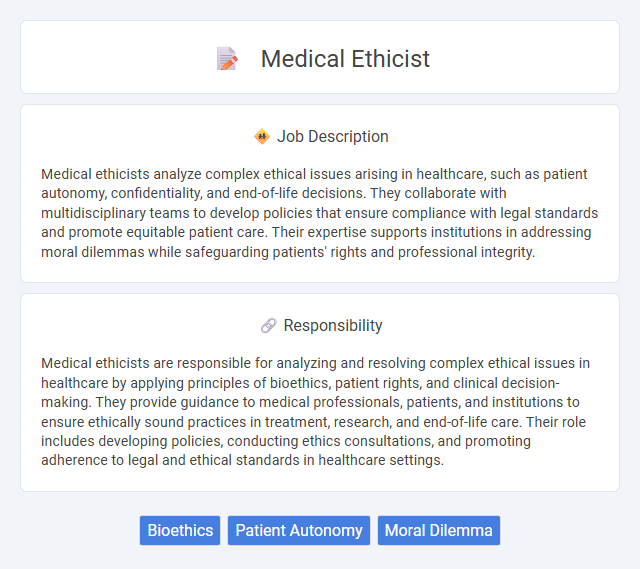
Medical ethicists analyze complex ethical issues arising in healthcare, such as patient autonomy, confidentiality, and end-of-life decisions. They collaborate with multidisciplinary teams to develop policies that ensure compliance with legal standards and promote equitable patient care. Their expertise supports institutions in addressing moral dilemmas while safeguarding patients' rights and professional integrity.
Individuals with a strong commitment to patient welfare and excellent critical thinking skills are likely suited for a Medical Ethicist role, as the job involves analyzing complex moral dilemmas related to healthcare. People who can remain impartial, demonstrate empathy, and communicate effectively with diverse stakeholders may have a higher probability of thriving in this profession. Those uncomfortable with ethical ambiguity or lacking a solid background in both medicine and ethics might find this job particularly challenging.
Qualification
Medical ethicists require advanced degrees in bioethics, philosophy, or healthcare-related fields, often holding a master's or doctoral qualification. Certification from recognized organizations such as the American Society for Bioethics and Humanities (ASBH) enhances credibility and professional standing. Strong knowledge of clinical practices, ethical theories, and legal frameworks is essential for effective evaluation and guidance in healthcare settings.
Responsibility
Medical ethicists are responsible for analyzing and resolving complex ethical issues in healthcare by applying principles of bioethics, patient rights, and clinical decision-making. They provide guidance to medical professionals, patients, and institutions to ensure ethically sound practices in treatment, research, and end-of-life care. Their role includes developing policies, conducting ethics consultations, and promoting adherence to legal and ethical standards in healthcare settings.
Benefit
A medical ethicist likely contributes to healthcare by promoting patient rights and ensuring ethical decision-making in complex medical situations. Their expertise probably helps minimize conflicts between patients, families, and medical staff, enhancing overall care quality. Collaborating with healthcare teams could lead to more equitable and informed treatment policies benefiting both patients and practitioners.
Challenge
Medical ethicists likely face the challenge of navigating complex moral dilemmas in healthcare where patient rights, clinician responsibilities, and institutional policies often conflict. They probably must balance competing interests while ensuring ethical standards align with evolving medical technologies and diverse cultural values. The demand for clear, compassionate guidance in these situations may require continuous education and strong communication skills.
Career Advancement
Medical ethicists advance by gaining expertise in bioethics, healthcare policy, and clinical consultation, often earning advanced degrees such as a Master's or PhD in bioethics or health law. Career progression can lead to roles like ethics committee chair, hospital ethics consultant, or academic faculty positions, enhancing influence on institutional policies and patient care standards. Publishing research, presenting at conferences, and networking within healthcare and academic communities further accelerate professional growth and recognition in the field.
Key Terms
Bioethics
A medical ethicist specializing in bioethics addresses complex moral issues arising from advances in medical technology, patient care, and clinical research. Their role involves analyzing ethical dilemmas related to human genetics, organ transplantation, end-of-life decisions, and informed consent to ensure compliance with legal standards and respect for patient autonomy. Bioethics expertise is critical in guiding healthcare policies, institutional review boards, and medical practitioners to balance scientific innovation with ethical responsibility.
Patient Autonomy
Medical ethicists play a crucial role in upholding patient autonomy by ensuring that individuals have the right to make informed decisions about their own healthcare. They analyze complex ethical dilemmas involving consent, confidentiality, and end-of-life care to advocate for patients' rights and respect their values. Their expertise guides healthcare providers in balancing medical recommendations with patients' personal beliefs and choices.
Moral Dilemma
Medical ethicists analyze complex moral dilemmas in healthcare, guiding decisions that balance patient rights, clinical outcomes, and ethical principles such as autonomy, beneficence, and justice. They evaluate cases involving end-of-life care, informed consent, and resource allocation to provide recommendations that uphold ethical standards while considering legal and cultural contexts. Their expertise helps healthcare professionals navigate conflicts between patient desires, family wishes, and institutional policies to ensure ethical integrity in medical practice.
 kuljobs.com
kuljobs.com